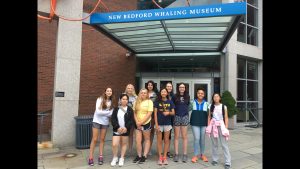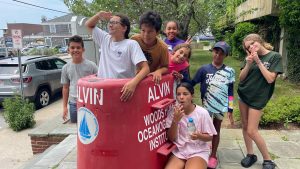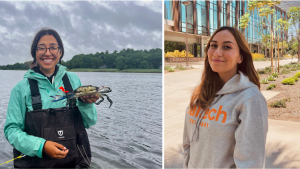Search results for: student%20cheap%20airline%20tickets%20phone%20number%201-800-299-7264
Update on K-12 Activities
March 2018 — The Woods Hole Sea Grant Education Program (WHSGEP) in collaboration with WHOI will again be offering its semi-annual teacher workshop, “Topics in Oceanography”. These workshops happen in the spring and fall and are designed to allow teachers to interact with our oceanographers, either visit their lab or go on a local field…
Read MoreFood Webs
Food Webs Background Food webs are dynamic and complex. Species in each trophic or feeding level rely on their prey base and in turn are critically important to the organisms that feed on them. Energy travels through the food web and steadily decreases with each trophic level it passes through as some is used for…
Read MoreConflict Resolution in the Assignment of Area Entitlements for Seabed Mining
Conflict Resolution in the Assignment of Area Entitlements for Seabed Mining Broadus, J.M. and P. Hoagland San Diego Law Review, Vol. 21, No. 3, pp. 541-576, 1984 WHOI-R-84-013
Read More2020 Program Development Projects
Program Development Projects 2024 Projects John Logan, MA Division of Marine Fisheries: Using eDNA to assess the importance of eelgrass as juvenile winter flounder habitat 2023 Projects Donna Dimarchopoulou, Mohammed Hashim, Chloe Dean, Adam Subhas, WHOI: Elevator pitches for labs: Building hands-on tools to communicate lab-based research. Naomi Steckman, Beyond the Bounds: Beyond the Bounds…
Read MorePreserving Our Homelands Camp Comes to WHOI
Most science educators will tell you, if you want to get kids excited about science, you have to actually do science. Last summer WHOI Sea Grant had the opportunity to participate in the annual “Preserving Our Homelands” (POH) camp, an interactive summer science camp for Mashpee Wampanoag Tribal middle schoolers. Through activities and outings, including visits…
Read MoreTeacher Workshop: December, 3 2021-Invasive Species
Marine Invaders: Green crabs and other local invasive species Presenters: Dr. Carolyn Tepolt, WHOI Biology Department – Invasive Species on Our Shores, Presentation Slides Dan Martino, co-owner, Cottage City Oysters – Invasive Species in Aquaculture, Presentation Slides Date: December 2021 Lesson Plans and Classroom Activities NOAA Live! 4 Kids recorded webinars: These…
Read MoreTeacher Workshop: October, 29 2019-Coastal Wetlands
Carbon Cycling in Coastal Wetlands Presenters: Dr. Anne Giblin, Marine Biological Laboratory (MBL) Senior Scientist – Rising Seas and the Fate of Coastal Salt Marshes Dr. Meagan Eagle Gonneea, U.S. Geological Survey Research Scientist – Blue Carbon in Our Backyard: Coastal Wetlands, Climate, Management, and Markets Date: October 2019 Lesson Plans…
Read MoreMassachusetts Sea Grant Fellows Focus in on Blue Crabs and Coastal Jellyfish
MIT Sea Grant and WHOI Sea Grant jointly announce two new Massachusetts Sea Grant Graduate Research Fellows In 2021, MIT Sea Grant and Woods Hole Oceanographic Institution (WHOI) Sea Grant announced a new fellowship program to support Massachusetts graduate students engaging in coastal and marine research. MIT Sea Grant and WHOI Sea Grant are welcoming…
Read MoreIndex of Workshops for Educators
Index of Workshops for Educators January 2026 Fishing for Data: Real world applications for oceanographic observations March 2025 Ocean Oxygen: Using forams to understand past, present, and future oceans December 2023 From Classrooms to Coastlines: An educator workshop about marine and freshwater harmful algal blooms (HABs) February 2023 Bringing Shark Research on Cape Cod into…
Read MoreFundamentals of Shellfish Farming
Fundamentals of Shellfish Farming Offered annually, this 10-week virtual interactive course will cover the basics of shellfish aquaculture with an emphasis on learning practical information. Students will be introduced to shellfish biology, hatchery & nursery production, field grow-out of oysters and clams, and safe shellfish handling and harvest practices. The course will also include materials…
Read More



